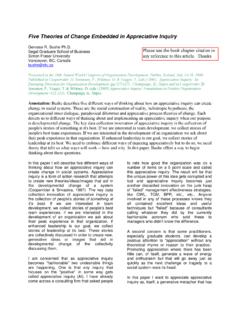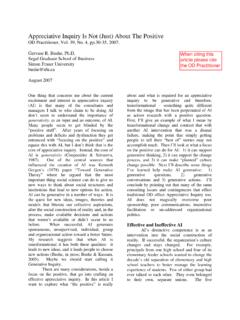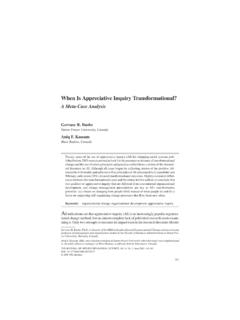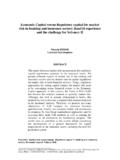Transcription of Foundations of Appreciative Inquiry: History, Criticism ...
1 AI PractitionerFebruary 20128 Volume 14 Number 1 ISBN 978-1-907549-08-3 More Articles at BusheProfessor of Leadership and Organization Development at the Beedie School of Business, he is one of the key researcher/practitioners of Appreciative inquiry . He is currently studying and writing about Dialogical Organization Development an attempt to identify the underlying basis of all planned, transformational change : traces the development of AI from Cooperrider s discovery of the excitement of focusing on what gives life to an organization through to the controversies and potential for AI moments include the transition of AI from a research approach to change process, development of the 4-D model and three waves of AI Criticism .
2 He concludes with Cooperrider s thoughts on the next transformational moment in was recently asked to write an overview of Appreciative inquiry (AI) (Bushe, 2012) and in the process of preparing that wanted to gain a clear view of its history as viewed by the main actors at the time. My conversations with them can help us to understand what AI is, and can be, and free us from being locked into the 4-D Model and the tendency to polarize negative and positive . I will also review some of the history of AI Criticism , and end this essay with what I think is the key controversy and potential AI faces at this moment in its brief history : the beginnings of AIThe origin of AI can be traced to the close relationship between the doctoral program in organizational behaviour (OB) at Case Western Reserve University in Cleveland, Ohio and the Cleveland Clinic Foundation, an esteemed health care organization with facilities only a few blocks apart from each other.
3 The doctoral program in OB at Case is unique in America in stressing both rigorous grounding in theory and research methods, while also stressing application of theory and method to the issues of organizational leadership and change. Many AI theorists and researchers are graduates ( , Barrett, Bright, Bushe, Cooperrider, Johnson, Ludema, Powley, Sekerka, Stavros and Thatchenkery).For over a decade, the Cleveland Clinic had served as a site for doctoral student research and consulting internships, and in 1979 a doctoral student named David Cooperrider was employed in one such internship as part of a research project on physician leadership.
4 As Cooperrider interviewed physician leaders throughout the organization he became more and more excited by the organizational processes and forms of governance that had evolved in what was a large and successful partnership of over 300 doctors. While the study collected data on problems and issues, Suresh Srivastva was impressed by the excitement in his young student. He encouraged him to put the problems aside and focus on what gave life and vitality to the of Appreciative inquiry : history , Criticism and PotentialAIP February 12 Bushe: Foundations of AIFeature Choice by Gervase BusheEach issue, a leading AI practitioner will present a topic of their choiceAI PractitionerFebruary 20129 Volume 14 Number 1 ISBN 978-1-907549-08-3 More Articles at on this study Cooperrider began to develop a theory of the egalitarian organization (Srivastva and Cooperrider, 1986).
5 Near the end of 1980 he was asked to present the emerging themes of that study to Cleveland Clinic s Board of Governors and put a footnote in the report that this was not focusing on problems but looking at what gave life to an extraordinary system and so was an Appreciative analysis . There was tremendous interest in that report and it created a stir throughout the that point it dawned on Cooperrider that his interest was shifting from issues of organization design and functioning to the nature of inquiry . Powerfully affected by Ken Gergen s (1978) ideas on social research and influenced also by Morgan s (1980) work on the power of metaphor to shape organizational theorizing, he thought organizational studies needed new metaphors that would be more generative.
6 He concluded that organization as a mystery and miracle could provide a continuously generative metaphor. While reading an anthology on the philosophy of art (Rader, 1979) he was struck by Rader s distinction between communities of interpretation (science) and communities of appreciation (art). Why should these be separate, he wondered? Why not bring them together? At his first presentation on the egalitarian organization at the Academy of Management in 1984, as an aside he showed a diagram contrasting problem solving with Appreciative analysis and proposed that, instead of seeing organizations as problems to be solved, organizations been seen as mysteries to be appreciated.
7 He was laughed year he and Frank Barrett, another student working under Srivastva, were engaged in an organization development (OD) project where the standard action research feedback process was being met with a high level of conflict and hostility. During a meeting amongst the three and Ron Fry (a professor), the emotional baggage from their experience led them to argue with each other. As that dynamic became more uncomfortable and unusual Srivastva said, I wonder if what is going on now is a consequence of the questions we are asking? At that moment a light bulb went off the power of questions, the deficit nature of most questions, questions beginning the change, inquiry as the engine of change and Appreciative inquiry was born.
8 Cooperrider and Barrett went off and reconceptualised everything they were doing with that client. They engaged the managers in an inquiry into the best practices in another organization which completely changed the dynamics in the system and led to major improvements (Barrett and Cooperrider, 1990). Concurrently, Cooperrider did a survey-based, empirical study on the impact of inquiry on social systems, which solidified his views and became his doctoral dissertation on Appreciative inquiry (Cooperrider, 1986).The first presentation of AI as a new change philosophyCooperrider s first presentation of AI to organization development (OD) scholars and practitioners at the 1985 OD Network Conference in San Francisco argued that problem-solving processes tended to exacerbate the problems they were attempting to solve, and that more change could be got from focusing members attention on the life giving properties of their social systems.
9 It was my first exposure to AI and I remember how the majority of those in attendance were incredulous at the suggestion that they should stop focusing on problems. It seemed too one sided. Many thought the argument that diagnosis should be abandoned, as it simply recreated the mental models of those doing the diagnosis, was fanciful at that moment a light bulb went off the power of questions .. inquiry as the engine of change and Appreciative inquiry was February 12 Bushe: Foundations of AI[Cooperrider] thought organizational studies needed new metaphors that would be more PractitionerFebruary 201210 Volume 14 Number 1 ISBN 978-1-907549-08-3 More Articles at small core of OD practitioners, however, disenchanted with how slow action research seemed and how little change seemed to come from conventional, participative change processes, were excited by the potential AI offered.
10 This change practice grounded in social constructionism promised a much higher level of engagement by system members. A few experiments utilizing this new philosophy (for at the time it was more a philosophy than a method) took place in the 1980s, the most significant of which was sponsored by John Carter of the Gestalt Institute of Cleveland. Carter s idea was to engage an organization with dozens of locations, in an organization-wide inquiry involving 600 interviews in a short time span. This led Carter to come up with the idea to train employees to interview other employees, an innovation that has become central to many AI interventions.










